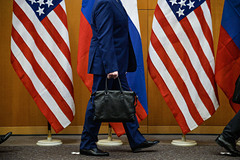The Week: Russian President Putin calculated the bluff of the US and NATO over Ukraine

Photo: Alexey Vitvitsky / RIA Novosti
The US must abandon NATO's eastward expansion and decide on its foreign policy priorities. Damon Linker, the author of the British edition of The Week, shared his opinion about the growing tension between Russia and the West.
Linker states that NATO has expanded its military influence around the world through the wars in Yugoslavia, the fight against al-Qaeda (a terrorist group banned in Russia ) in Afghanistan, the invasion and occupation of Iraq and the overthrow of the regime of Muammar Gaddafi in Libya. He summarizes that NATO has long ceased to be a defensive alliance, not embarrassed to use military force first.
The columnist of the publication said that the United States has always acted as if it intended to protect certain countries from large-scale military threats and give them guarantees of security and support, although in fact they were never ready for this. The experience with Iraq and Afghanistan has shown that Washington's guarantees on Ukraine are also a bluff, and Russian President Vladimir Putin was able to calculate this.
“Now our geopolitical rivals are no longer ready to give in to us all the time. Putin, for example, seems determined to test the assumption that Russia has much more at stake in Russia's near abroad than we do. And it is likely that the outcome of this test will be in his favor, ”the author suggested.
Linker believes that NATO is in a stalemate. If the West retreats from its positions in Europe, this will be a signal to China in a conflict with Taiwan, but if the alliance continues to bluff, this will lead to an increase in military tensions, and this may have unpredictable consequences.
In conclusion, the author calls for an honest and public recognition of the bluff and retreat to positions from which the United States and NATO are really ready to fight the threat of escalation, demonstrating this determination to Washington's geopolitical rivals in the clearest possible way. “The crisis in Ukraine should be seen as an opportunity to take on this painful but necessary process of choosing our battlefields more judiciously,” says Linker.
Earlier, US national security adviser Jake Sullivan said in an interview with CBS that next week Washington would be ready to announce new steps in contacts with Moscow.
Consultations on the issues of a security treaty in Europe were held on January 10 in Geneva, and on January 12 a meeting of the Russia-NATO Council was held in Brussels. In addition, on January 13, a meeting of the Permanent Council of the Organization for Security and Cooperation was held in Vienna, where Russian proposals were also considered.

